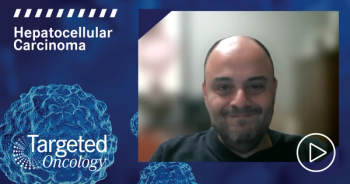
Case 1: A 60-Year-Old With Unresectable Hepatocellular Carcinoma
Sharing the first patient case of unresectable hepatocellular carcinoma, experts consider optimal screening and diagnosis practices in this setting.
Episodes in this series

Transcript:
Ghassan K. Abou-Alfa, MD: Thank you for joining this Targeted Oncology™ presentation titled “Hepatocellular Carcinoma Treatment Advances.” It’s a Virtual Tumor Board®. My name is Ghassan Abou-Alfa. I’m from Memorial Sloan Kettering Cancer Center, and I’m delighted and honored to be with great panelists. Dr Riad Salem from Northwestern University, maybe you could say a word or 2.
Riad Salem, MD, MBA: Thanks, Ghassan. I’m the chief of interventional radiology and the vice chair of image-guided therapy at Northwestern Medicine in Chicago, Illinois. I’ve been here for about 20 years, and my area of research is hepatocellular carcinoma [HCC].
Ghassan K. Abou-Alfa, MD: Great, thank you so much. It’s great having you aboard. Dr Amit Singal?
Amit Singal, MD: Thanks, Ghassan. I’m excited to be here. I’m a medical director of our liver cancer program and the chief of hepatology at UT [The University of Texas] Southwestern Medical Center in Dallas, Texas. I’ve been here for 10 years. Like Riad, my area of clinical and research interest is hepatocellular carcinoma.
Ghassan K. Abou-Alfa, MD: That’s excellent. It’s good to see you again, Dr Singal. Now that we have a great doctor from Chicago and a great doctor from Dallas, we need somebody from the East Coast. Dr Yarchoan?
Mark Yarchoan, MD: Thank you so much, Ghassan. It’s a pleasure to be here. I’m Mark Yarchoan, and I’m a medical oncologist at Johns Hopkins Medicine in Baltimore, Maryland, focused on hepatocellular carcinoma and immunotherapy in particular.
Ghassan K. Abou-Alfa, MD: Thank you again, Mark. It’s great seeing you all. We’ll be focusing on the treatment of advances in hepatocellular carcinoma. In today’s presentation, my colleagues and I will review clinical cases, discuss approaches of treating patients with hepatocellular carcinoma, and share our perspectives on key clinical trials that may impact our decisions. We’ll start with the first case of unresectable hepatocellular carcinoma. This patient is a 60-year-old Asian man with a history of chronic hepatitis B. He was treated for hepatitis B about 7 years ago, and he presents with a concern of abdominal pain to his gastroenterologist—a right upper quadrant pain. His performance status is 1. The work-up included an MRI and a large liver lesion. At 12 cm, it’s abutting the major blood vessels with multiple small lesions around it. A biopsy confirmed HCC [hepatocellular carcinoma], and the tumor was deemed unresectable after a surgical evaluation. As such, the patient was recommended to go on a chemoembolization, and that was given 3 times. There’s a lot of information that was presented. I’d like to touch on key points. I’ll start with Dr Singal. As a hepatologist, that biopsy story: yes or no? What are your thoughts?
Amit Singal, MD: Ghassan, as you know, hepatocellular carcinoma has been an interesting cancer. It’s 1 of the few that we’ve been able to diagnose radiographically in many at-risk patients, including patients with cirrhosis and select patients with hepatitis B. If somebody has arterial phase hyperenhancement or delayed-phase washout, that’s typically classified as a LI-RADS [Liver Imaging Reporting and Data System] LR-5, and it can be called HCC with a 95% to 97% positive predictive value. Interestingly, those criteria have not been as well validated in patients with chronic hepatitis B. There are fewer data in chronic hepatitis B and only in select patient populations.
As far as we can tell, he’s noncirrhotic. In a noncirrhotic setting, and without the details of his chronic hepatitis B, some of these patients deserve biopsy to confirm the diagnosis. In general, we’re going back and forth on this whole biopsy question. Five years ago, I was firmly in the camp that we shouldn’t do routine biopsies in some of these patients, but now we’re seeing that some of these patients have mixed tumors. Some of these patients have cholangiocarcinoma that we didn’t recognize previously. The field is reassessing the role of biopsy in these patients. In this case in particular, we probably would have done a biopsy, given that he was noncirrhotic.
Ghassan K. Abou-Alfa, MD: Dr Yarchoan, we hear the word cirrhosis a lot with the treatment of hepatocellular carcinoma. Do you have any mechanism of how you diagnose cirrhosis? Is it more about what you hear or are told? Is it a bit of a guesstimate?
Mark Yarchoan, MD: These cases often come through our liver multidisciplinary clinic. All of us approach these cases a little differently. Normally, it’s a clinical gestalt for us. What are the laboratory values? Is there clear evidence of cirrhosis on the skin? More and more, as Amit said, we’re erring on the side of biopsy, especially when, like this, there’s no clear evidence of cirrhosis. I agree with that recommendation.
Ghassan K. Abou-Alfa, MD: I second what you said, Mark. There’s no firm way of diagnosing cirrhosis. At the same time, we just mentioned hepatitis B, which can cause hepatocellular carcinoma without cirrhosis per se. As such, a biopsy would be a necessity. At the same time, I’ll add to what Dr Singal mentioned in regard to LI-RADS. LI-RADS is a great language for doctors to talk to one another, but it’s not 100% operatory diagnostic. As we heard, there’s no full validation for it. That’s why a biopsy would probably be deemed necessary. Before we move on to treatment, where we’re going to need a lot of help from Dr Salem as an interventional radiologist, what’s the recommendation for screening for patients with hepatitis B in regard to HCC. Dr Singal?
Amit Singal, MD: Ghassan, when you look at this story, the patient presented symptomatically and was found to have a large tumor. This highlights that because he was not receiving screening, this tumor was unfortunately found at a large stage. When somebody has hepatitis B, they can develop HCC in the absence of cirrhosis. When you combine with other risk factors, this can happen at a relatively early age. If you have vertical transmission—which can happen in high-risk countries, many in Asia, Africa—the recommendation is to screen men starting at age 40 in the setting of chronic hepatitis B and women at age 50. This is because the male sex is an independent risk factor for HCC.
If somebody has a family history of HCC, you start screening early as well, and this screening should be done using an abdominal ultrasound with a blood-based tumor biomarker called alpha-fetoprotein [AFP]. When you use these 2 in combination, they should be done semiannually. If it’s done in an expert center, you can find the vast majority of HCC at an early stage. There are select patients with obesity, with significant liver nodularity, for whom ultrasound doesn’t work as well and you may need to consider alternative imaging modalities, such as MRI. For a majority of patients, particularly in chronic hepatitis B, where the liver is often less nodular, we do an ultrasound and AFP every 6 months in these high-risk individuals.
Ghassan K. Abou-Alfa, MD:Thanks so much. I’ll summarize what we’ve heard so far because it’s very important. No. 1 is that a biopsy is a necessity because we’re dealing with localized disease, because we’re unclear about the cirrhotic component, and because of the relative limitation of LI-RADS. No. 2 is that the screening that’s best understood at this point is an ultrasound and then AFP on an every-6-months basis. Despite that, the risk factors are the same. They’re probably applied the same to the 2 sexes. Men, because of a genetic makeup, are more prone to HCC. That’s why we probably see more of the disease in that situation.
Transcript edited for clarity.










































